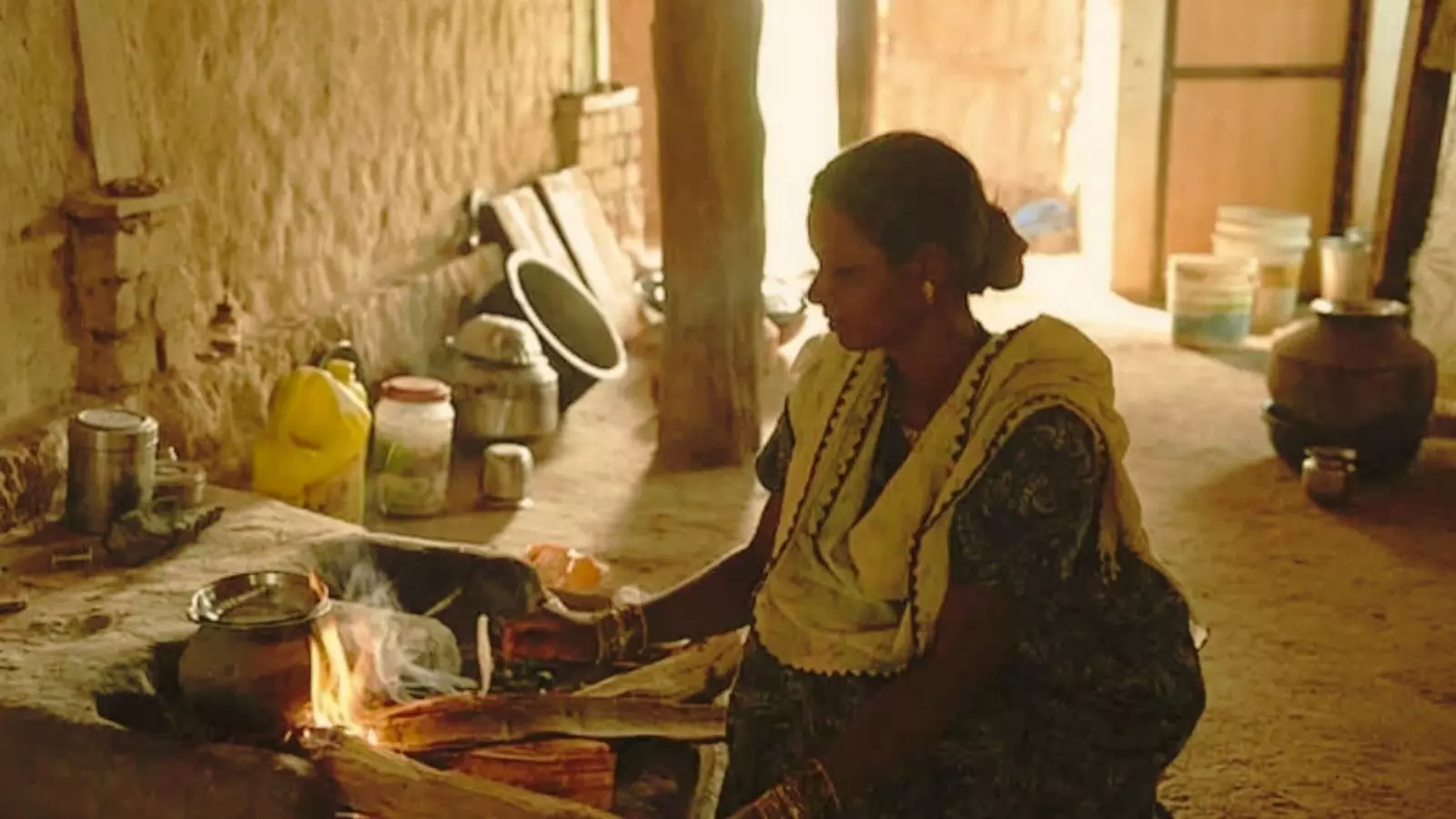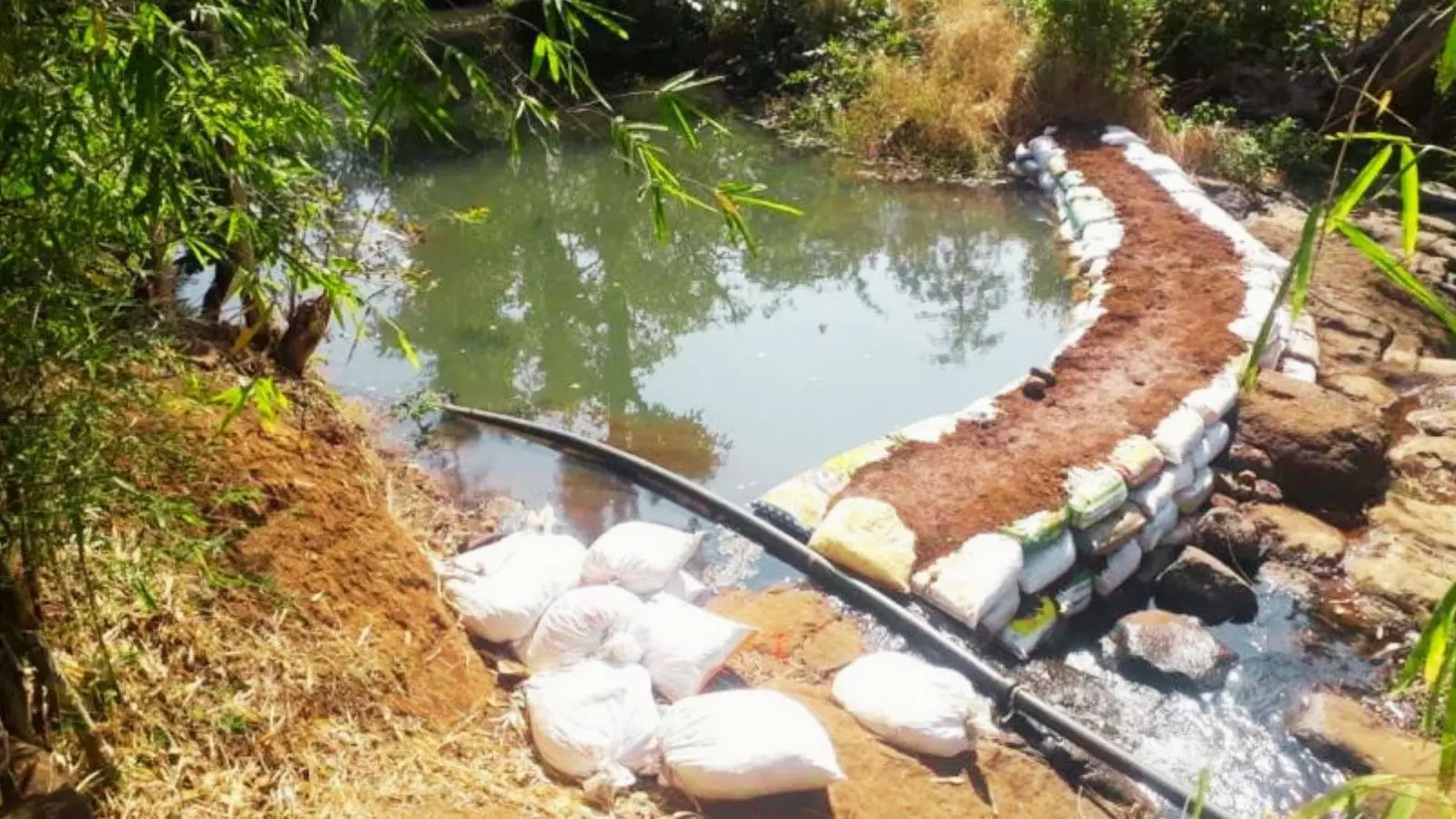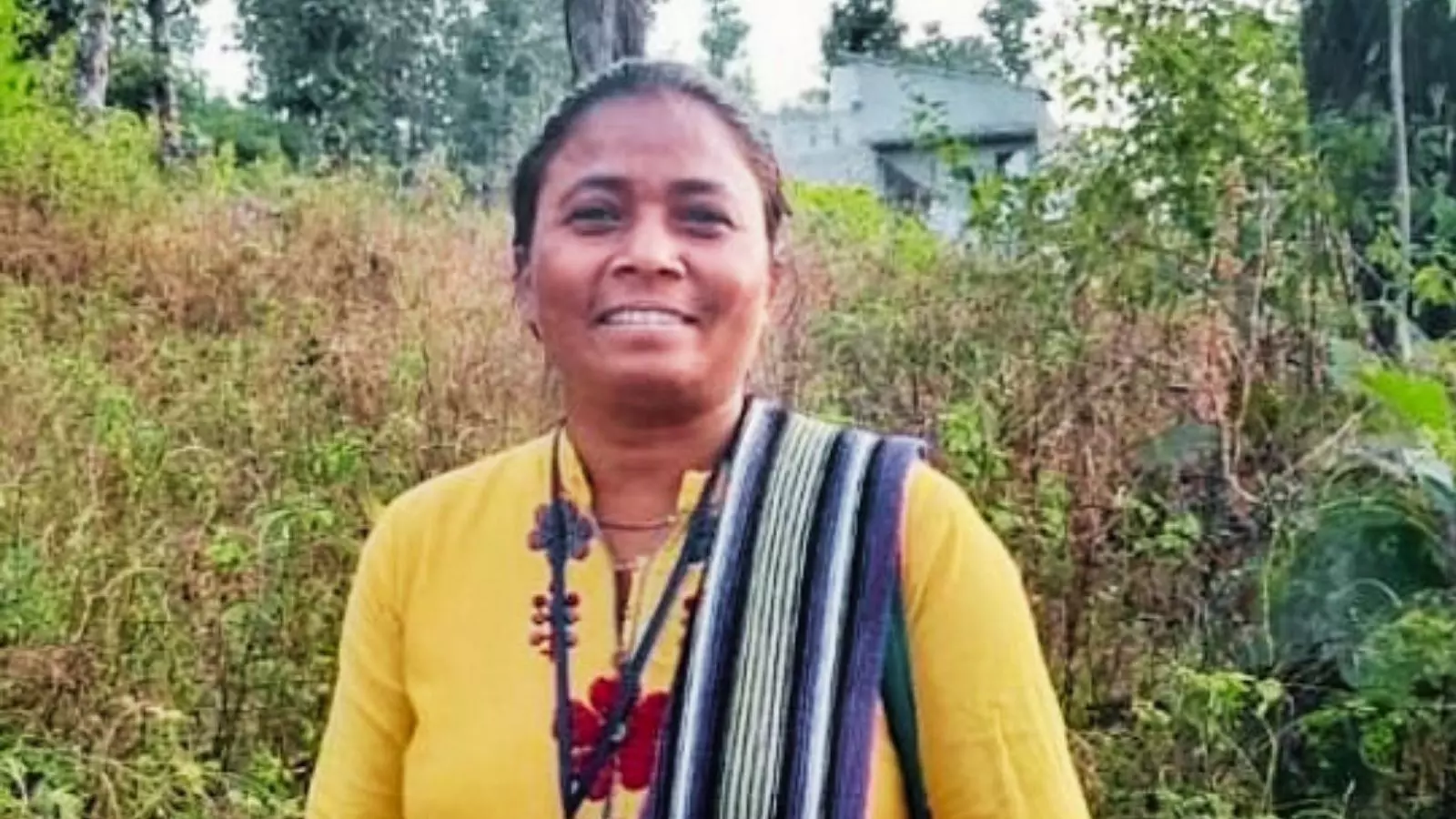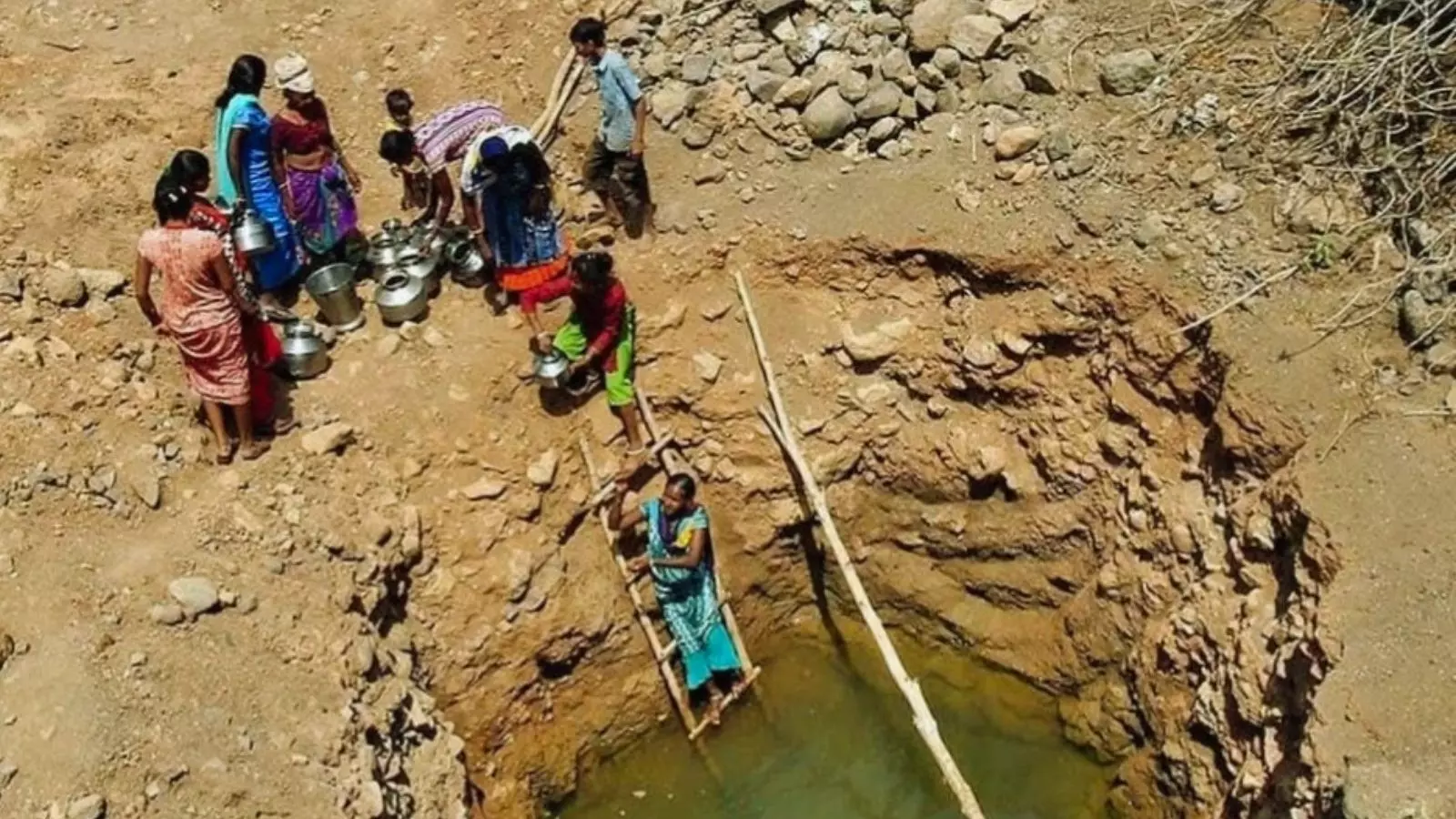
- Home
- India
- World
- Premium
- THE FEDERAL SPECIAL
- Analysis
- States
- Perspective
- Videos
- Sports
- Education
- Entertainment
- Elections
- Features
- Health
- Business
- Series
- In memoriam: Sheikh Mujibur Rahman
- Bishnoi's Men
- NEET TANGLE
- Economy Series
- Earth Day
- Kashmir’s Frozen Turbulence
- India@75
- The legend of Ramjanmabhoomi
- Liberalisation@30
- How to tame a dragon
- Celebrating biodiversity
- Farm Matters
- 50 days of solitude
- Bringing Migrants Home
- Budget 2020
- Jharkhand Votes
- The Federal Investigates
- The Federal Impact
- Vanishing Sand
- Gandhi @ 150
- Andhra Today
- Field report
- Operation Gulmarg
- Pandemic @1 Mn in India
- The Federal Year-End
- The Zero Year
- Science
- Brand studio
- Newsletter
- Elections 2024
- Events
Drought prone to water surplus, how women in a Gujarat village ushered a water revolution

Pangarbari, a small hamlet by the Narmada river nestled between thick forest with the Sahyadri hills on three sides in Dharampur taluka in south Gujarat’s Valsad district, has been a popular local tourist destination.The tribal-dominated village with a population of about 1,738 has been predominantly dependent on the seasonal local tourism that goes up every monsoon. Despite being located...
Pangarbari, a small hamlet by the Narmada river nestled between thick forest with the Sahyadri hills on three sides in Dharampur taluka in south Gujarat’s Valsad district, has been a popular local tourist destination.
The tribal-dominated village with a population of about 1,738 has been predominantly dependent on the seasonal local tourism that goes up every monsoon. Despite being located on the banks of Narmada and getting heavy rainfall every season, people of Pangarbari have never been able to use their land for cultivation.
The picturesque village had everything but water to drink or cultivate.
“Women of Pangarbari used to work all day and get free by early evening — only to fetch water. We had two choices, either fill water from a stream (generating from Narmada river) downhill and then carry the pots up the hill for about 10 kilometres or walk around six or seven kilometres to fetch water from a public well. In peak summers, the water level in the well would go so low that we had to climb down at least 30 to 40 to the well and then climb up precariously with the filled pot,” says Saraswatiben, the sarpanch of Pangarbari village.

Saraswatiben, the sarpanch of Pangarbari village, says earlier women of her village would spend five to six hours walking up and down the hill to fetch just two or three pots of water.
“Every day, we spent at least five to six hours walking up and down the hill to fetch just two or three pots of water. We would carry two pots on each hand and carry one on our heads,” she adds.
“We were promised a borewell in the year 2017 by the local MLA Arvindbhai Patel. In 2017, our village decided to boycott the state polls because no politician ever heard us. We wrote ‘no water, no vote’ on the trees, stones and on our walls and blocked every leader from entering the village during the campaign. That’s when the Arvindbhai Patel stood at the entrance to the village and apologised for neglecting us and promised that a borewell would be constructed in the village within a year. We never got that borewell. In 2022, we boycotted the polls once again and did not vote,” Savritiben, another resident of the village and a member of the panchayat, tells The Federal.

A boribund built by the Pangarbari women.
Noticeably, in 2017 assembly polls, Arvindbhai Patel won as a Congress MLA from Dharampur constituency that comprises of Pangarbari village. However, he switched to BJP in 2019 and in 2022 Assembly polls, Patel won from Dharampur once again as a BJP candidate.
However, people of Pangarbari never got the borewell promised to them. But things began to change when in 2023, the tribal women led by Saraswatiben Padvi, the sarpanch of Pangarbari decided to take matter into their own hands.
“We got tired of waiting for the government to do something for the village. We wrote to the taluka panchayat and district panchayat so many times about the issue. We even went to Valsad city to submit a memorandum to the collector in February 2022. But all of our efforts went in vain. Then one day, I heard about Neetaben from a relative in a village in Vapi district. Neetaben had told the women how they can be water-sufficient village,” shares Padvi.

Neetaben helped women from Pangarbari make their village water-sufficient.
“I was desperately looking for help for years and I was intrigued. I went and met Neetaben within a week. In the end of March 2023, she visited our village and spoke to women of Pangarbari. She taught us how we can be water sufficient by harvesting rain water and that changed everything for our village,” she adds.
The authorities of Valsad are, however, oblivious to the problems faced by the women of Pangarbari.
“We have never received any complaints from the village. However, water scarcity is a common issue here since it’s a hilly terrain. The district water supply board has been working on it and will submit a feasibility report if a borewell can be drilled in the village,” says YR Rana, the tehsil land revenue officer.
“Narmada flows around 10 kilometres from Pangarbari and the village receives heavy to moderate rainfall for at least four months to five months in a year. Yet the village remained parched for years,” tells 42-year-old tribal woman Neeta Patel, a resident of Navsari district, who has helped several tribal villages to become water sufficient.
“Tribals of Pangarbari have been enduring abject apathy of the government machinery for years. In 2017, after being promised a borewell, local authorities complained that there were no roads leading to the village so they wouldn’t be able to install. Before the advent of summer in 2018, the villages pooled in Rs 11,500 and built a makeshift road by themselves so that the borewell can be installed before the summer. But the authorities never came. This time they complained of hilly terrain and how their machines won’t drill through the rocky soil,” adds Patel.
A postgraduate in Rural Studies from New Delhi’s Shree Sant Kabir Training Institute, Neeta encountered extreme water scarcity growing up in Mograwadi village in Navsari.
“My family owns an acre of land on which we grew crops during the monsoon. The rest of year, my parents worked as agrarian labourers while my two brothers and I did odd jobs like cutting grass, harvesting sugarcane or picking mangoes for Rs 12 a day,” she says.
“In 2000, I drew out a plan to harvest rainwater and create a supply channel for the entire village. But it was initially refused by the panchayat. But after two years of efforts they were convinced and we formed a group of women to carry out the task as men still were not fully convinced. In 2002, the project got recognition from the government and the then Narendra Modi-led state government named the group – Pani Samiti,” Neeta says.
In October 2002, the government of Gujarat constituted the Water and Sanitation Management Committee under the Rural Housing and Rural Development Department to form such Pani Samitis to make villages water sufficient. The Committee are supposed to pay 90 per cent of the cost incurred by Pani Samitis to install a water harvest and supply system while 10 per cent is paid by the gram panchayat.
Pani Samitis were designated to be elected standing committees under gram panchayats with adequate representation of gram panchayat, with 50 per cent women members. It is co-terminus with gram panchayat and is required to be reconstituted after the Gram Panchayat election every two years.
“Despite the government provision, the scheme remained largely on paper. The officials never approached the tribal dominated villages on the slopes of Sahaydri across south Gujarat. Most of these villages face acute water crisis as the rainwater flows downstream it doesn’t percolate the soil,” shares Patel, who took it upon herself to create awareness about the scheme and help villages form Pani Samitis.
Pani Samiti in Pangarbari
In August 2023, 11 tribal women of Pangarbari – Savitaben Rana, Laliben Padvi, Savritiben Padvi, Niviben Padvi, Hetalben Vasava, Goyaben Vasava, Hetalben Padvi, Reemaben Patel, Gulabiben Vasava, and Fuliyaben Rana under the village sarpanch Saraswatiben Padvi, volunteered to form Pani Samiti.
“From planning to maintenance or handling of any damage or breakage in the pipelines, we manage it all,” says a proud Savritiben Padvi, a member of Pani Samiti.
After Neetaben drew the plan of the rainwater harvesting system, it took six months for the women of the Pangarbari Pani Samiti to build the whole set up.
“It took us about one month to get permission from Dharampur gram panchayat and pass the plan. Then we bought pipes and tanks and other necessary materials. We plowed the soil to install the pipes and make boribunds ourselves. After four months, men of our village joined us and Neetaben brought some men from neighbouring village for help. Together, it took us six months to install the tanks, pipeline and taps at each house,” shares Saraswatiben.
The women built four boribunds across the village. Boribunds are a type of check dam made with gunny bags filled with soil that are designed to slow down the flow of rainwater allowing sediment to deposit and thereby increasing soil moisture. Six large tanks each with capacities of 35,000, 40,000, 30,000, and 40,000 litres were later built with the help of with the help of the Astol Scheme, inaugurated by Prime Minister Narendra Modi in June 2022.
“The boribund ensured that our land is cultivable while it also leaves us with enough water in monsoon to use for other purposes. However, we also opted for the high tanks under the government scheme to ensure that we have surplus water during the dry months,” says Swaraswatiben.

Women risked their lives to draw water from the local well.
“By March 2024, the Pani Samiti was able to supply more than two lakh litres of water daily through 315 household tap connections. Now, we get tap water every morning from right behind our house. This has brough much-needed relief to women of the village. Now, we can peacefully manage both household chores and farming and still have free time for ourselves,” says Savritiben.
“Earlier, men used to go out of the village for odd jobs and work as daily wage labourers. I worked as an agrarian laborer in Vapi for Rs 250 a day. I used to save money so that I could visit home on alternate weekends. Now, I cultivate my own land that our family owned behind our house. Last year, I grew onion and potato and planted some banana trees which have yielded fruits this season,” says 38-year-old Mangalbhai, husband of Savritiben.
“We bath and wash clothes every day. It is a luxury for us. These women did not just help themselves, they changed the fate of our village,” shares a beaming Mangalbhai.
